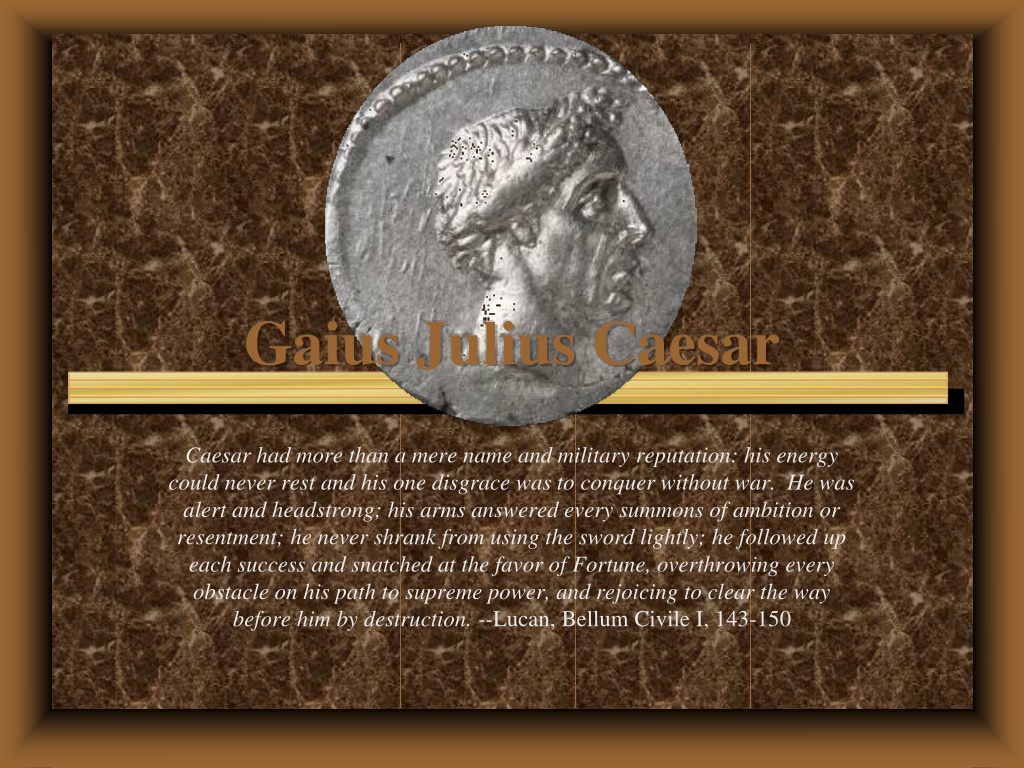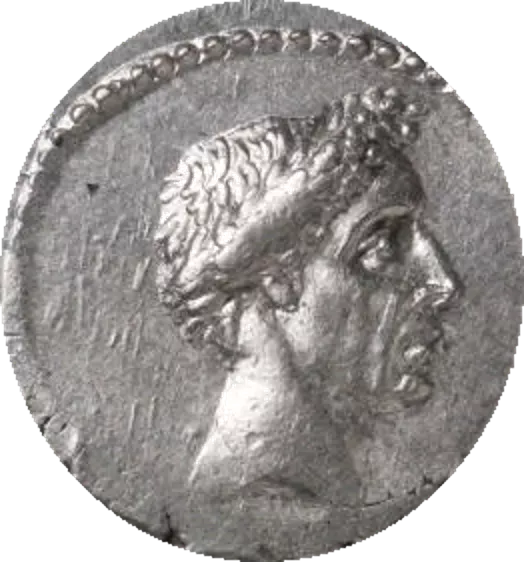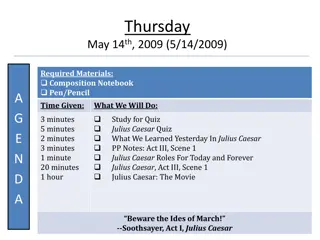Gaius Julius Caesar: Rise to Power and Triumphs
Born in 100 BC to a struggling family, Gaius Julius Caesar defied the odds, rising through the political ranks with unmatched ambition and military prowess. From conquering Gaul to forming alliances like the First Triumvirate, his journey was marked by triumphs and risky decisions, culminating in the crossing of the Rubicon and the ultimate pursuit of supreme power in Rome. Caesar's legacy is one of strategic acumen, relentless pursuit of ambitions, and unwavering determination.
Download Presentation

Please find below an Image/Link to download the presentation.
The content on the website is provided AS IS for your information and personal use only. It may not be sold, licensed, or shared on other websites without obtaining consent from the author. Download presentation by click this link. If you encounter any issues during the download, it is possible that the publisher has removed the file from their server.
E N D
Presentation Transcript
Gaius Julius Caesar Caesar had more than a mere name and military reputation: his energy could never rest and his one disgrace was to conquer without war. He was alert and headstrong; his arms answered every summons of ambition or resentment; he never shrank from using the sword lightly; he followed up each success and snatched at the favor of Fortune, overthrowing every obstacle on his path to supreme power, and rejoicing to clear the way before him by destruction. --Lucan, Bellum Civile I, 143-150
The Early Years Born to a not-so-well-off patrician family in 100 BC in a plebeian neighborhood of Rome. After a civil war, Caesar was left penniless and almost lost his life while still a teenager. He joined the army at age 18 and serves for four years.
The (Legal) Rungs of Power Was elected a Senator at age 30. At age 34 he was put in charge of public entertainments. He spent lavishly, and won great popularity. Was elected Pontifex Maximus at age 36. This post was for life, and brought power, wealth, and prestige (plus a big house in the Forum!) At age 39, then became military governor in Spain, where he earned his reputation as a general. Was elected Consul, the highest office in Rome, at age 41.
The First Triumvirate Wealth, popularity, military commands are all creating new and great opportunities for personal power. Marcus Licinius Crassus: the Richest man in Rome Cnaeus Pompeius Magnus: the most successful General of the time Caesar: up-and-coming, popular, and Consul
Gaul After his Consulship, Caesar makes sure he s appointed governor of Illyricum, Italian Gaul, and then Gaul-across-the-Alps. This gives him the opportunity to command troops again, and to conquer territory. This also gives him the opportunity for great wealth. Through his Commentaries of the war, published back in Rome, he gains even greater celebrity.
Risking All Crassus dies in battle in Parthia. The Senate convinces Pompey to oppose Caesar rather than work with him. Caesar, after eight years in Gaul, is ordered to surrender his armies and return to Rome (to stand trial!). Caesar invades Italy with his Legions. Alea iacta est! The die is cast.--Caesar, crossing the Rubicon into Italy with his army. (Suetonius, Life of Caesar)
Civil War--Again! Pompey and the leading Senators flee to Greece to ready their army. Caesar easily takes Italy, Rome, and Spain. Outnumbered two to one, he faces Pompey in Greece, and crushes him. Pompey flees to Egypt.
Caesars Coins Caesar was the first Roman to have his face put on a coin while he was still alive The Romans believed only ancestors and gods could be pictured Caesar was equating himself with gods and Eastern kings
Ego sum Caesar He has himself appointed Dictator-for-Life. Caesar now rules alone, using friends, freedmen, and slaves to govern--ignoring the Senate. Was Caesar a KING? Starts wearing an all-purple toga: the garment of a triumphal general representing the god Jupiter. Was Caesar a GOD?
CLEOPATRA Became Queen of Egypt at the age of 17 Joint Ruler of Egypt with her brother Ptolomy XII Egyptian custom meant that she had to marry him Ptolomy was aged 12 He died aged 18
Ptolomy Ptolomy and Cleopatra did not get along. Ptolomy s advisors drove Cleopatra out into the desert so Ptolomy XIII could rule alone. Pompey fled to Egypt after being defeated by Julius Caesar Ptolomy had Pompey beheaded and presented his head to Julius Casar
Ptolomys Mistake This was a big miscalculation Pompey was still Consul of Rome and Julius Caesar s son- in-law Julius Caesar demanded that Pompey s assassins be handed over to him Ptolomy refused Julius Caesar fought against Ptolomy s army. Ptolomy, weighted by his armor of gold, drowned in the River Nile Cleopatra s third brother Ptolomy XIV becomes joint ruler
Julius and Cleopatra Julius Caesar had Cleopatra restored to the throne of Egypt Cleopatra became Caesar s mistress Cleopatra s son Caesarean was probably Caesar s son She and Caesarean lived in Rome with Julius. Caesar refused to recognize Caesarean as his heir
The Julian Forum Julius Caesar created the Julian Forum. (named after himself) The Forum was needed because the old forum had become to small to deal with the amount of people.
The Ides of March A group of over fifty Senators decide that enough is enough--they are not ready to relinquish power and control of Rome to one man. They conspire to murder Caesar on March 15, 44 BC. They invite him to be crowned and declared King of Rome. He arrives to find 50 Senators with knives hidden in their togas. They promptly stabbed him to death. This coin, issued by Brutus, commemorates Caesar s assassination. Brutus had hoped he and the other conspirators would be seen as heroes liberating the Republic from a tyrant.
The Aftermath Caesar s body is cremated in a massive public demonstration in the Forum. A temple is built to Divine Julius in that spot. The conspirators are forced to flee. Civil war again breaks out, with Caesar s right-hand-man, Marc Antony, and his heir, Octavian, conquering the armies of Brutus, Cassius, and the Senators.
Caesars Lasting Impact Caesar provided a blueprint for rising to absolute power in Rome--a blueprint both Octavian and Antony followed. His name became one of the titles for the Roman emperors. The more modern Czar and Kaiser derive from his name too. Caesar began the practice of granting Roman citizenship to conquered peoples. This helped to prolong the expansion and maintenance of the Roman Empire.
Caesars Lasting Impact His Commentaries are one of the great pieces of Latin literature. He inspired one of Shakespeare s most celebrated plays. His reform of the calendar has been changed very little over the past two millenia. The month July is named for him.

 undefined
undefined























